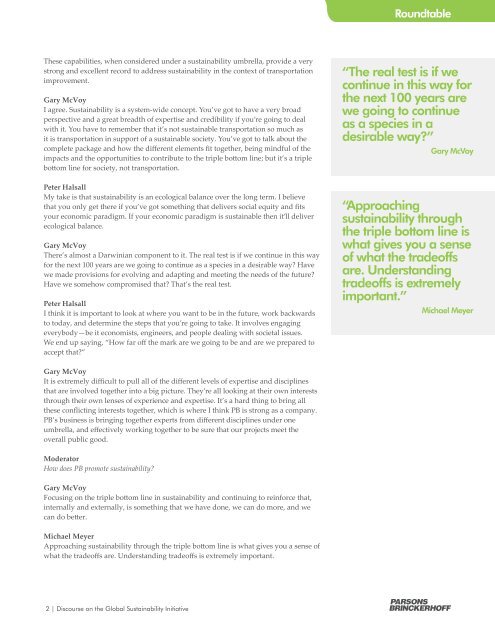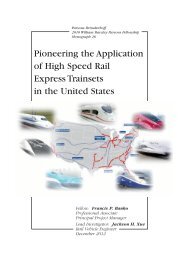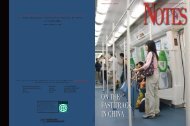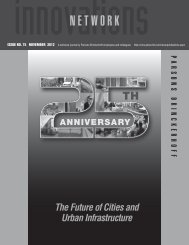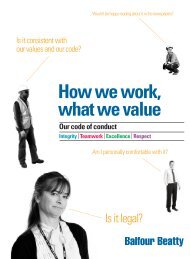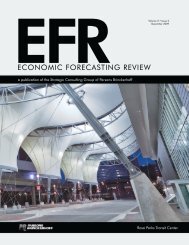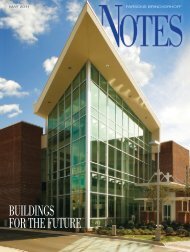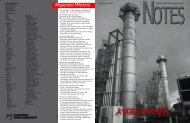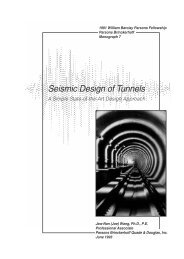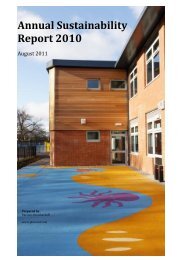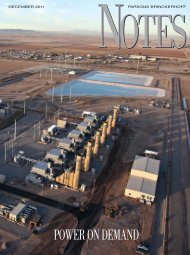June 2011 - Parsons Brinckerhoff
June 2011 - Parsons Brinckerhoff
June 2011 - Parsons Brinckerhoff
Create successful ePaper yourself
Turn your PDF publications into a flip-book with our unique Google optimized e-Paper software.
Roundtable<br />
These capabilities, when considered under a sustainability umbrella, provide a very<br />
strong and excellent record to address sustainability in the context of transportation<br />
improvement.<br />
Gary McVoy<br />
I agree. Sustainability is a system-wide concept. You’ve got to have a very broad<br />
perspective and a great breadth of expertise and credibility if you’re going to deal<br />
with it. You have to remember that it’s not sustainable transportation so much as<br />
it is transportation in support of a sustainable society. You’ve got to talk about the<br />
complete package and how the different elements fit together, being mindful of the<br />
impacts and the opportunities to contribute to the triple bottom line; but it’s a triple<br />
bottom line for society, not transportation.<br />
Peter Halsall<br />
My take is that sustainability is an ecological balance over the long term. I believe<br />
that you only get there if you’ve got something that delivers social equity and fits<br />
your economic paradigm. If your economic paradigm is sustainable then it’ll deliver<br />
ecological balance.<br />
Gary McVoy<br />
There’s almost a Darwinian component to it. The real test is if we continue in this way<br />
for the next 100 years are we going to continue as a species in a desirable way? Have<br />
we made provisions for evolving and adapting and meeting the needs of the future?<br />
Have we somehow compromised that? That’s the real test.<br />
Peter Halsall<br />
I think it is important to look at where you want to be in the future, work backwards<br />
to today, and determine the steps that you’re going to take. It involves engaging<br />
everybody—be it economists, engineers, and people dealing with societal issues.<br />
We end up saying, “How far off the mark are we going to be and are we prepared to<br />
accept that?”<br />
“The real test is if we<br />
continue in this way for<br />
the next 100 years are<br />
we going to continue<br />
as a species in a<br />
desirable way?”<br />
Gary McVoy<br />
“Approaching<br />
sustainability through<br />
the triple bottom line is<br />
what gives you a sense<br />
of what the tradeoffs<br />
are. Understanding<br />
tradeoffs is extremely<br />
important.”<br />
Michael Meyer<br />
Gary McVoy<br />
It is extremely difficult to pull all of the different levels of expertise and disciplines<br />
that are involved together into a big picture. They’re all looking at their own interests<br />
through their own lenses of experience and expertise. It’s a hard thing to bring all<br />
these conflicting interests together, which is where I think PB is strong as a company.<br />
PB’s business is bringing together experts from different disciplines under one<br />
umbrella, and effectively working together to be sure that our projects meet the<br />
overall public good.<br />
Moderator<br />
How does PB promote sustainability?<br />
Gary McVoy<br />
Focusing on the triple bottom line in sustainability and continuing to reinforce that,<br />
internally and externally, is something that we have done, we can do more, and we<br />
can do better.<br />
Michael Meyer<br />
Approaching sustainability through the triple bottom line is what gives you a sense of<br />
what the tradeoffs are. Understanding tradeoffs is extremely important.<br />
2 | Discourse on the Global Sustainability Initiative


